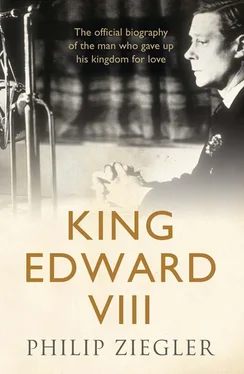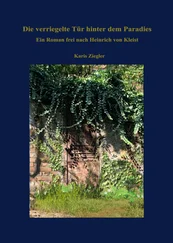The King had objected to the proposal that the visit to Rome should include a call on the Pope but Balfour, the Foreign Secretary, insisted that this was essential. 76Dutifully, the Prince paraded at the Vatican. He was not greatly struck by what he saw: he found Pope Benedict XV unprepossessing in his appearance, ‘tho intelligent and well informed and he talks fairly decent French’. The Prince kept the conversation to generalities; ‘and I most certainly did not kiss his ring,’ he told the Queen proudly. ‘Nothing would have induced me to!!’ 77This sturdy independence availed nothing with the Daily Express , who reported that the Prince ‘appeared to be greatly gratified by his visit’. Under the headline ‘Visit which should not have been made’, the Express condemned the King for not having stepped in to veto it. 78George V considered the report a direct attack on the Crown, all the worse because the proprietor, Lord Beaverbrook, was a member of the government. 79
‘Much tho one loathes the —— Huns, one can’t help admiring the way they are sticking out the war,’ the Prince wrote to King George V in October 1917. 80Their first offensive subsided, but there were signs that it was about to be renewed when the time came to celebrate the royal Silver Wedding in London. The last thing the Prince wanted was to become involved in what promised to be wearisome festivities. He persuaded Cavan to cable the King arguing that it would make a bad impression in Italy if the Prince left at so critical a moment. 81The King agreed, but little in the way of a German attack ensued, indeed, within a few weeks the enemy lines were crumbling all across Europe.
The war was clearly ending. The plan had been for the Prince to spend three months at the end of 1918 taking a staff course at Cambridge, but with time running out Haig pleaded that he should instead visit the Dominion and American troops in France. The King left the final decision to his son, who had been looking forward to three relatively easy months at home. ‘Of course I never hesitated as to what was the right thing,’ the Prince wrote. ‘… one has to sink one’s personal feelings and wishes on these occasions.’ 82He was being disingenuous as well as priggish; Cambridge might have been enjoyable but nothing would have induced him to leave the continent with final victory so close.
He hoped that he would be able to visit the Dominion forces with a minimum of fuss. He was quickly disabused by Lord Stamfordham. The Prince of Wales could not visit Canadian or Anzac troops un-officially: ‘On the contrary these visits … have an undoubted political significance and may have far-reaching effects upon the Empire and Crown. You will be there as … Heir to the Throne and every word and deed will have its own particular influence.’ Pressmen would follow him everywhere and the coverage they gave him would affect the reception he received when he visited the Dominions after the war. He would be constantly in the public eye. 83It was a melancholy reminder to the Prince that with the armistice a new form of penal servitude would begin and that this time the sentence would be for life.
The Canadians were the first on whom he called. He was euphoric about his reception. ‘They are great lads these old “Knucks”,’ he told Joey Legh, ‘real, husky stout-hearted fellows for whom I’ve a great admiration.’ 84He was overwhelmed by their cheerfulness and friendly informality: ‘How I wish I had been across to Canada, and living amongst them makes me just long to go there.’ 85His only complaint was that they tended to assume that they had done all the serious fighting and to speak with some disdain of the ‘Imperial’ or British troops. ‘Still, I just don’t listen when they talk like that, it’s only really a pose and the best fellows never talk like that.’ 86A report from an unidentified Canadian colonel somehow found its way into the Windsor archives. The Prince, it read, ‘had been the best force in real Empire building that it was possible for Great Britain to have, because he absolutely won the hearts of the many he came in contact with. As they put it, he was every inch the gentleman and sportsman, so simple, so charming and so genuine …’ 87Even allowing for hyperbole, he seems to have made himself uncommonly well liked.
The armistice was signed while the Prince was with the Canadian Corps. ‘I feel it can’t be more than a marvellous dream and I still feel in a sort of trance,’ he told the Queen. ‘But I suppose I shall soon wake up to the fact that it all really is true.’ 88It was soon time for him to move on. ‘I don’t think my month with the Australians will be so pleasant somehow,’ the Prince had written, when his love of all things Canadian was at its height. ‘These Canadians are so much more English and refined.’ 89His first reaction, indeed, was to find the Australian troops somewhat shy and rough, but ‘that’s because they live so far from England’, he concluded charitably. 90It did not take him long to decide that he liked them enormously, and they seem to have responded quite as warmly. ‘The Prince has won the hearts of the Australians,’ General Rawlinson told Wigram. His stay had been an unqualified success; he would be fervently welcomed in Australia; not just because he was Prince of Wales ‘but as a personal matter between the soldiers and himself’. The Prince was nervous about his forthcoming visit to General Pershing, Rawlinson went on, ‘but it is both right and necessary for him to be with the Americans for a period’. 91
The Prince had in fact long been anxious to see something of Pershing and the 2nd US Army. In common with most British he had been quick to denounce the ‘rotten Americans’ who sat back and let the allies do the fighting. ‘They said they were “too proud to fight”; I have never heard such rot!! Of course it is their game to keep out of it.’ 92But once they were in the war, his enthusiasm for their efficiency and fighting qualities rapidly grew. They welcomed him rapturously at their headquarters at Coblenz and put twenty thousand men on parade to honour him, making some of them march twenty-five miles for this privilege. The Prince professed mild surprise: ‘How far more democratic we really are, and the American discipline is really fearfully strict.’ 93Yet the spirit of the men, the quality of the drill and turnout, the immense vitality and exuberance, impressed him profoundly. ‘They are a big power in the world now,’ he told his father, ‘I might say the next biggest after ourselves, and they are worth while making real friends with … I’m just crammed full of American ideas just now, and they want me to “go over to them” as soon as possible, which is another item for consideration and one that should not be “pigeon-holed”.’ 94
His time with the Australians and Americans took him into occupied Germany. He found himself billeted at Bonn in the home of the Kaiser’s sister, Vicky, Princess of Schaumburg-Lippe, and was outraged to find photographs of his family displayed in the principal rooms – ‘I feel so ashamed, however one is consoled by the thought that we’ve “cut them right out” for ever!!’ He was still more annoyed when the Princess addressed him as ‘dear’ and told him that the Germans would have been able to continue the war for several years but for the revolution. Rather grudgingly he admitted that she seemed ‘a nice enough woman for a Hun’, no doubt because she was ‘one third English’. 95 *4
He had no doubt that the Germans must be ruthlessly crushed and complained to the King about the ‘idiotically mild and lenient treatment of this —— Hun population. No one,’ he claimed, with more justice than usually accompanies such a boast, ‘is more against a bullying spirit than I am, as that would only place us on the same level as the Huns … But we are not making these Huns feel that they are beaten … There is no danger of serious fraternization as, thank goodness, the infantry and in fact all the men, still loathe the Huns and despise them. Of course, as regards the women, well all women in the world are made the same way, whether German or Japanese or any race you like, so that isn’t fraternization, it’s medicinal …’ 96The spirit behind these words was neither magnanimous nor far-sighted. It was, however, shared by almost every junior officer, indeed by every soldier, in the allied armies. They read curiously in the light of later charges that he had been pro-German from his childhood and thus an easy convert to Nazi doctrines.
Читать дальше












